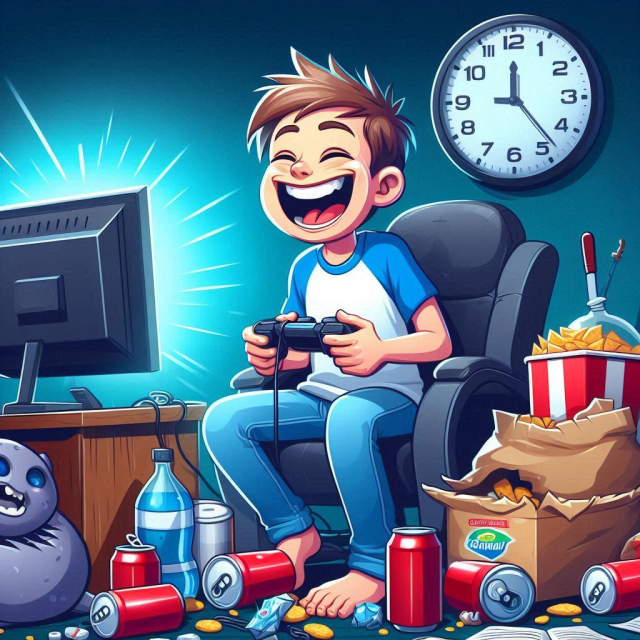The world of video games has evolved drastically since its beginnings. What started as a simple form of entertainment has grown into a multi-billion dollar industry, with millions of players around the world. However, with this growth has also arisen a significant concern: video game addiction. This phenomenon, also known as video game addiction, has generated debates about its effects on the mental, physical and social health of players. In this article, we will explore in depth what video game addiction is, its causes, consequences, and how to address it.
What is the Video Game Vice?
Video game addiction refers to compulsive and excessive behavior towards video games that interferes with the individual's daily life. The World Health Organization (WHO) officially recognized "gaming disorder" in its International Classification of Diseases (ICD-11) in 2018. This disorder is characterized by a persistent or recurrent pattern of behavior, which may include:
- Lack of Control: Inability to control the time spent playing.
- Increasing Priority: Video games become more important than other interests and daily activities.
- Continuation or Escalation of Gambling: Persistence in gambling despite negative consequences.
Causes of Video Game Addiction.
The causes of video game addiction are multifaceted and can vary from one person to another. Below are some of the most common reasons:
- Escape from Reality: Many people turn to video games to escape personal problems, stress or anxiety.
- Intrinsic Rewards: Video games are designed to offer constant rewards, which can lead to compulsive behavior.
- Social Interaction: Online video games allow players to interact and compete with others, which can be especially attractive to those seeking social connection.
- Personality and Psychological Factors: Individuals with certain personalities, such as those who seek sensations or have difficulty managing stress, may be more likely to develop an addiction.
Consequences of Video Game Addiction.
Video game addiction can have a wide range of negative consequences on a person's life. These consequences can be physical, mental, social and academic.
Physical consequences:
- Health Problems: Sedentary lifestyle, obesity, posture problems and carpal tunnel syndrome.
- Sleep Disturbances: Insomnia and sleep disorders due to long hours of gaming.
Mental Consequences:
- Stress and Anxiety: Video games can increase stress and anxiety, especially in competitive games.
- Depression: Social isolation and lack of interaction in real life can lead to depression.
Social Consequences:
- Social Isolation: Reduced face-to-face interaction with friends and family.
- Relationship Problems: Difficulties in maintaining healthy relationships due to excessive time spent playing.
Academic and Work Consequences:
- Academic Performance: Decrease in academic performance due to lack of time dedicated to studies.
- Work Problems: Decreased productivity at work and conflicts with colleagues and supervisors.
How to Address the Video Game Addiction.
Addressing video game addiction requires a multidimensional approach that includes both prevention and intervention. Here are some strategies to manage and overcome video game addiction:
- Set Limits: Set clear limits on the time spent playing and stick to them.
- Seek Professional Help: Psychologists and therapists can provide time management techniques and strategies for dealing with stress.
- Engage in Other Activities: Participate in physical activities, hobbies and social events to diversify the use of time.
- Education and Awareness: Increase awareness about the risks of video game addiction and educate gamers and their families on how to identify and manage the signs of addiction.
- Social Support: Maintain a strong social support network and seek help from friends and family.
Prevention Strategies.
Preventing video game addiction is crucial, especially in children and adolescents, who are more susceptible. Below are some prevention strategies:
- Parental Supervision: Parents should supervise their children's playtime and set clear rules.
- Promotion of Alternative Activities: Encourage children to participate in sports, artistic activities and other hobbies.
- Early Education: Teach children from an early age about the responsible use of video games.
- Model Healthy Behavior: Parents should lead by example by modeling balanced use of technology and video games.
Cases and Testimonies.
To better understand the impact of video game addiction, it is useful to examine cases and testimonies of people who have struggled with this addiction. Here are some examples:
- Juan's Testimony: Juan, a college student, shared his experience of how video games began to affect his studies and personal relationships. Realizing the problem, he sought professional help and began setting limits on his gaming time, which allowed him to improve his academic performance and relationships.
- Maria's Story: Maria, a mother of a teenager, noticed that her son was spending more and more time playing video games and neglecting his school responsibilities. With the help of a therapist, they worked together to find a healthy balance between playtime and other activities.
Video game addiction is a real and growing problem that affects people of all ages. Understanding its causes, consequences and how to address it is crucial to prevent and treat this addiction. With a combination of education, supervision, and support, it is possible to enjoy video games in a healthy and balanced way. The key is to maintain control and ensure that video games do not interfere with other important aspects of life.






